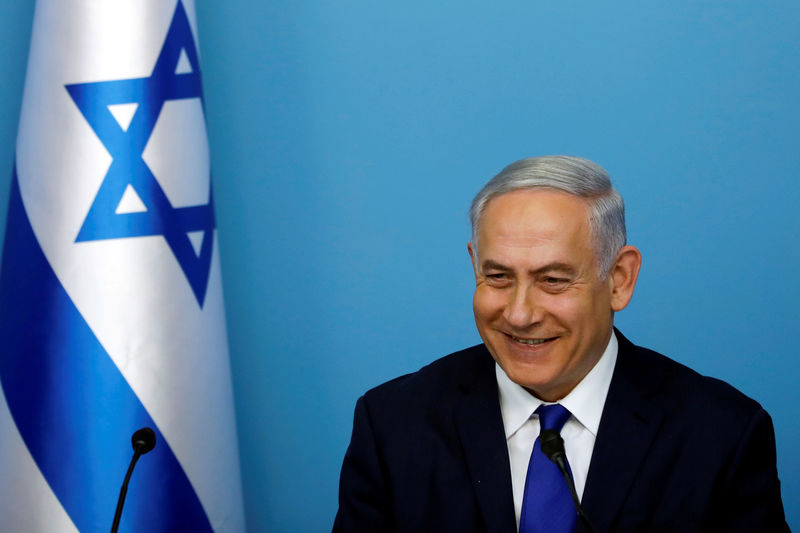By Maayan Lubell and Ori Lewis
JERUSALEM (Reuters) - Israel's tough stance on Iran has boosted Prime Minister Benjamin Netanyahu's popularity at home, and he can expect more good press in the coming days when the United States opens its embassy in Jerusalem.
Three corruption investigations against Netanyahu, who has hardly been out of the headlines for weeks, show no sign of denting his popularity among his support base.
As the closest Middle East ally of President Donald Trump, Netanyahu has been central to U.S. decisions that have reshaped the political map of the region.
On April 30, he appeared on prime-time television to present Israel's case that Trump should abandon the 2015 international nuclear deal with Iran.
The president did so barely a week later.
Netanyahu publicly hailed the decision and followed up with air strikes on Iranian military positions in Syria, a country that borders Israel and which Israel fears may increasingly be used as a base by Iran to attack the Jewish state.
A poll on Channel 2 television the day after Trump scrapped the Iran deal showed Netanyahu's right-wing Likud party would gain five seats if elections were held now, winning 35 in the 120-seat parliament and strengthening its position in a ruling coalition. A poll in April had Likud on 28 seats.
On Thursday Israel accused Iran of firing rockets from Syria into the Israeli-occupied Golan Heights, the first time that Iran has attacked Israel with rockets.
Israel struck back with its heaviest air strikes in Syria since the start of the Syrian civil war in 2011, saying that it attacked nearly all of Iran's military infrastructure.
That attack came too late for a poll in the Israeli daily newspaper Maariv on Friday. But the survey found that 69 percent of respondents were satisfied with Netanyahu's handling of "Israel's policy regarding Iran's presence in Syria."
The survey also showed 59 percent of Israelis polled said they considered Trump's decision to pull out of the deal and reimpose U.S. sanctions on Tehran would aid Israel's security.
But 54 percent of respondents said they feared a direct military confrontation with Iran was looming and agreed with officials who said that it would be better "to have the fight now and not at a later stage," the paper said.
Israel's next elections are set to be held in November 2019, but Netanyahu could seek an early ballot to capitalize on the boost in popularity.
"Benjamin Netanyahu placed his chips on Trump and on him leaving the nuclear deal and he is now celebrating big-time with 35 seats. He has shown that there is nobody to match him in the diplomatic-security field," Israel Radio political analyst Hanan Kristal said.
BUSY CALENDAR
Abraham Diskin, political science professor with the Hebrew University said standing up to Iran was likely to increase support for Netanyahu, as it would for any government, left or right.
Despite Likud's surge, Diskin said, the balance of power between right- and left-wing blocs in the Israeli Knesset, pr parliament, had not significantly changed.
"According to the poll, Netanyahu doesn't have a majority but he does hold all the cards," he said in a phone interview with Reuters.
The corruption investigations against Netanyahu "are perceived by his supporters as persecution and as the probes drag on, his supporters are strengthened in this belief," Diskin said.
The next few days see "Jerusalem Day" on Sunday, the date in the Hebrew calendar when East Jerusalem was captured in the 1967 Middle East war.
A day later, on May 14, the United States will open its embassy in Jerusalem. The ceremony is timed to coincide with the day in 1948 -- on the western calendar -- that Israel declared its independence.
May 15 is the day Palestinians commemorate what they call the "Nakba", or "Catastrophe", when hundreds of thousands fled or were driven out of their homes in 1948.
Israel's security forces have readied themselves for Palestinian protests to mark the embassy move from Tel Aviv and the anniversary, with the Islamist militant group Hamas talking of attempts to breach the Gaza-Israel border.
Most Israelis, from across the political spectrum, see the U.S. embassy move as a rubber stamp on recognition of Jerusalem as Israel's capital.

Israel has always regarded the city as its eternal and indivisible capital but the city has not gained that recognition internationally. The United Nations regards East Jerusalem as being held under military occupation by Israel, and Palestinians say it must be the capital of their future state.